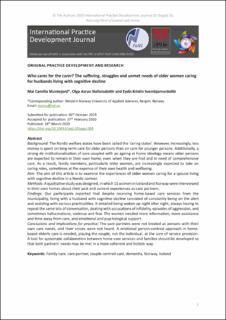| dc.contributor.author | Munkejord, Mai Camilla | |
| dc.contributor.author | Stefánsdóttir, Olga Ásrun | |
| dc.contributor.author | Sveinbjarnardóttir, Eydís Kr. | |
| dc.date.accessioned | 2020-04-24T07:18:39Z | |
| dc.date.available | 2020-04-24T07:18:39Z | |
| dc.date.created | 2020-03-19T12:22:24Z | |
| dc.date.issued | 2020 | |
| dc.identifier.citation | Munkejord, M. C., Stefansdottir, O. A., & Sveinbjarnardottir, E. K. (2020). Who cares for the carer? The suffering, struggles and unmet needs of older women caring for husbands living with cognitive decline. International Practice Development Journal, 10(Suppl), 1-11. | en_US |
| dc.identifier.issn | 2046-9292 | |
| dc.identifier.uri | https://hdl.handle.net/11250/2652319 | |
| dc.description.abstract | Background: The Nordic welfare states have been called the ‘caring states’. However, increasingly, less money is spent on long-term care for older persons than on care for younger persons. Additionally, a strong de-institutionalisation of care coupled with an ageing at home ideology means older persons are expected to remain in their own home, even when they are frail and in need of comprehensive care. As a result, family members, particularly older women, are increasingly expected to take on caring roles, sometimes at the expense of their own health and wellbeing. Aim: The aim of this article is to examine the experiences of older women caring for a spouse living with cognitive decline in a Nordic context. Methods: A qualitative study was designed, in which 11 women in Iceland and Norway were interviewed in their own homes about their past and current experiences as care partners. Findings: Our participants reported that despite receiving home-based care services from the municipality, living with a husband with cognitive decline consisted of constantly being on the alert and assisting with various practicalities. It entailed being woken up night after night, always having to repeat the same bits of conversation, dealing with accusations of infidelity, episodes of aggression, and sometimes hallucinations, violence and fear. The women needed more information, more assistance and time away from care, and emotional and psychological support. Conclusions and implications for practice: The care partners were not treated as persons with their own care needs, and their voices were not heard. A relational person-centred approach in home-based elderly care is needed, placing the couple, not the individual, at the core of service provision. A tool for systematic collaboration between home care services and families should be developed so that both partners’ needs may be met in a more coherent and holistic way. | en_US |
| dc.language.iso | eng | en_US |
| dc.publisher | Foundation of Nursing Studies | en_US |
| dc.relation.uri | https://www.fons.org/Resources/Documents/Journal/Vol10Suppl/IPDJ_10Suppl_005.pdf | |
| dc.rights | Navngivelse-Ikkekommersiell 4.0 Internasjonal | * |
| dc.rights.uri | http://creativecommons.org/licenses/by-nc/4.0/deed.no | * |
| dc.subject | damily care | en_US |
| dc.subject | care partner | en_US |
| dc.subject | couple-centred care | en_US |
| dc.subject | dementia | en_US |
| dc.subject | Norway | en_US |
| dc.subject | Iceland | en_US |
| dc.title | Who cares for the carer? The suffering, struggles and unmet needs of older women caring for husbands living with cognitive decline | en_US |
| dc.type | Peer reviewed | en_US |
| dc.type | Journal article | en_US |
| dc.description.version | publishedVersion | en_US |
| dc.rights.holder | © The Authors 2020 | en_US |
| dc.source.pagenumber | 1-11 | en_US |
| dc.source.journal | International Practice Development Journal | en_US |
| dc.source.issue | 10 | en_US |
| dc.identifier.doi | https://doi.org/10.19043/ipdj.10Suppl.005 | |
| dc.identifier.cristin | 1802420 | |
| dc.relation.project | Norges forskningsråd: 287301 | en_US |
| cristin.ispublished | true | |
| cristin.fulltext | original | |
| cristin.qualitycode | 1 | |

